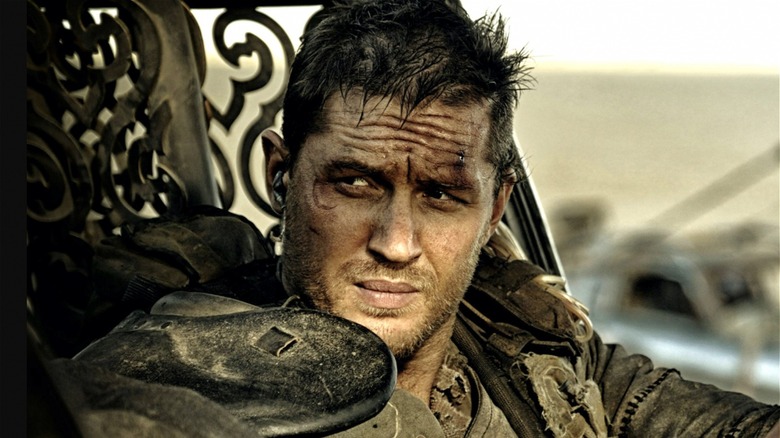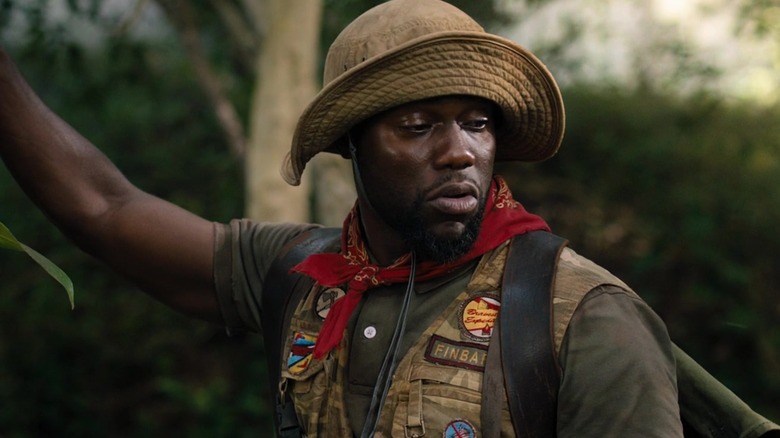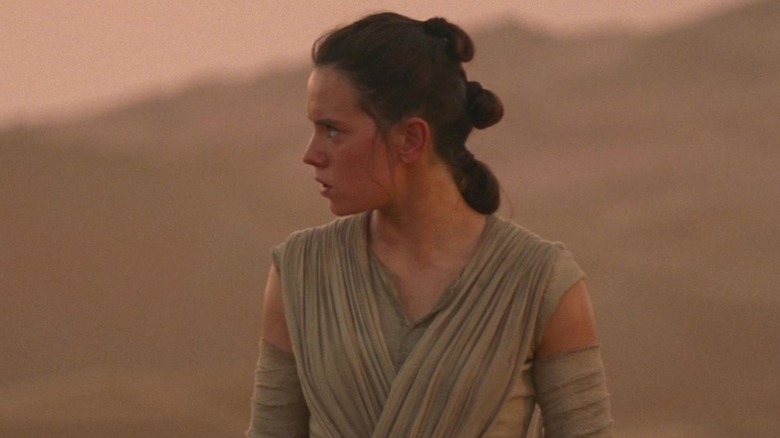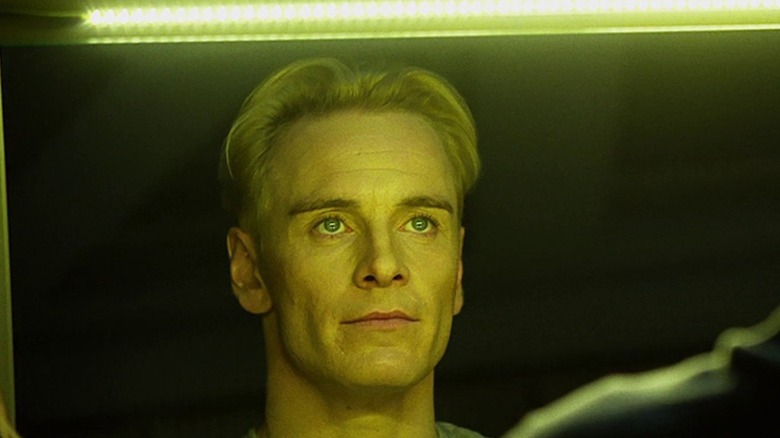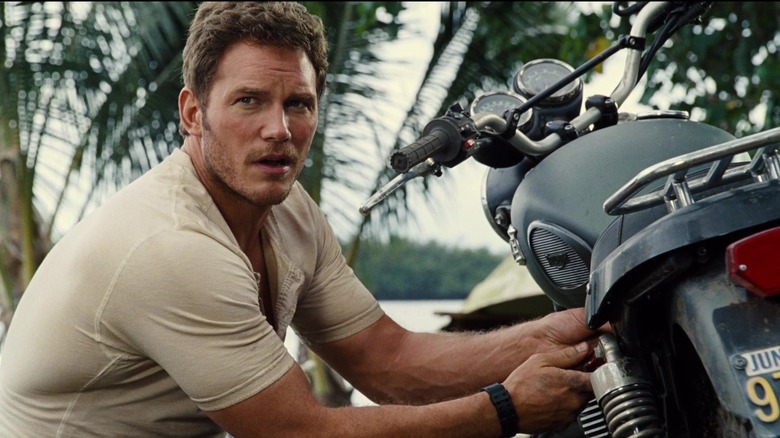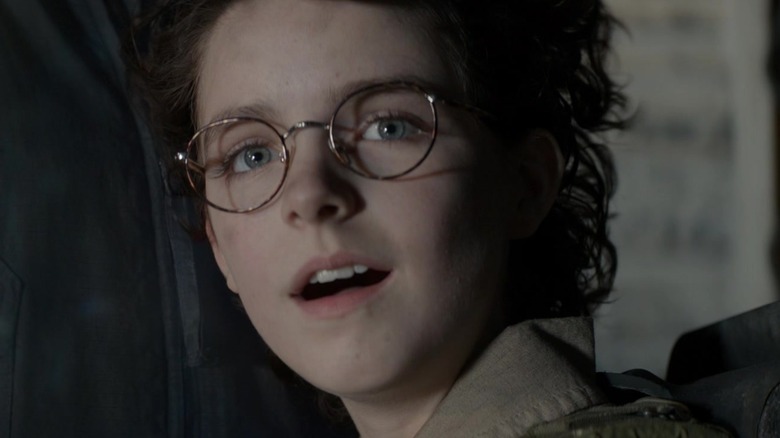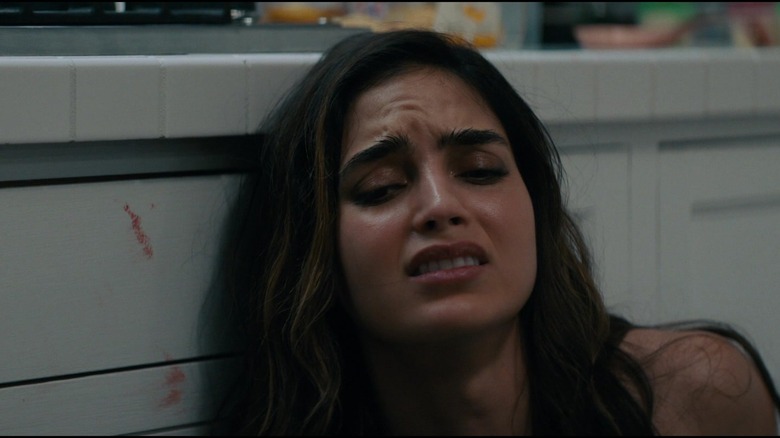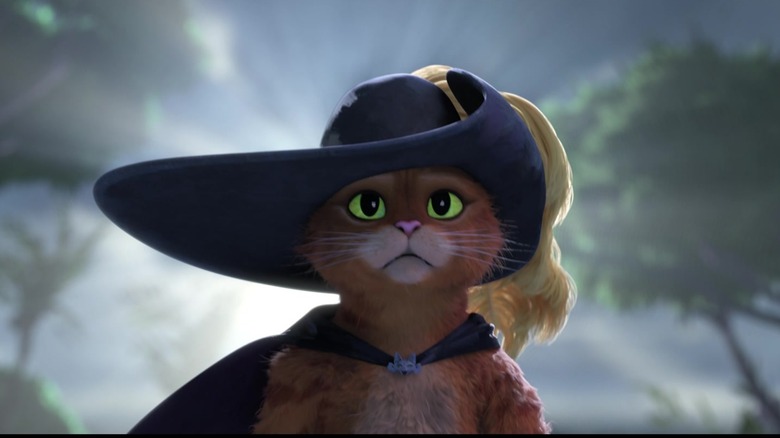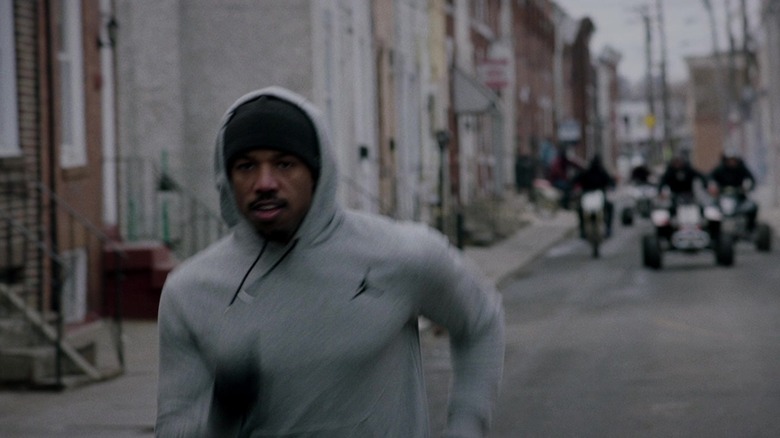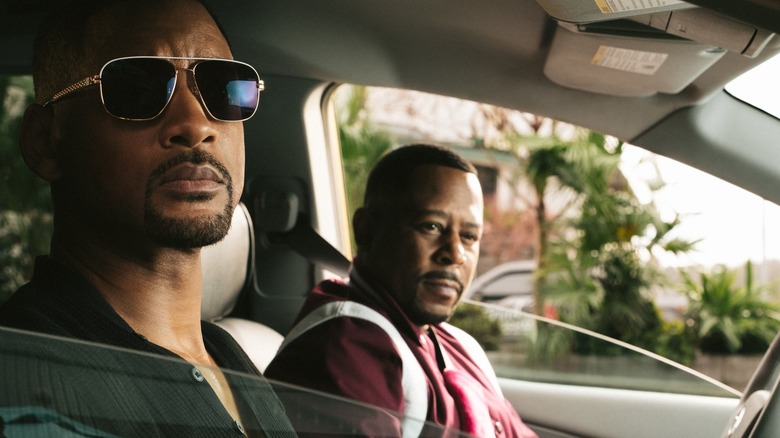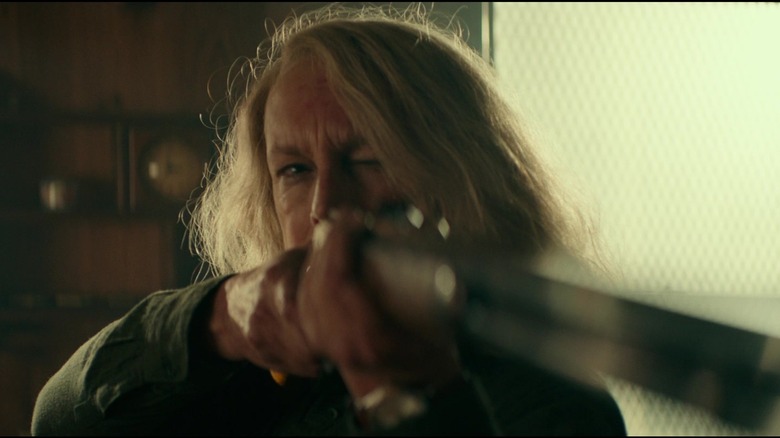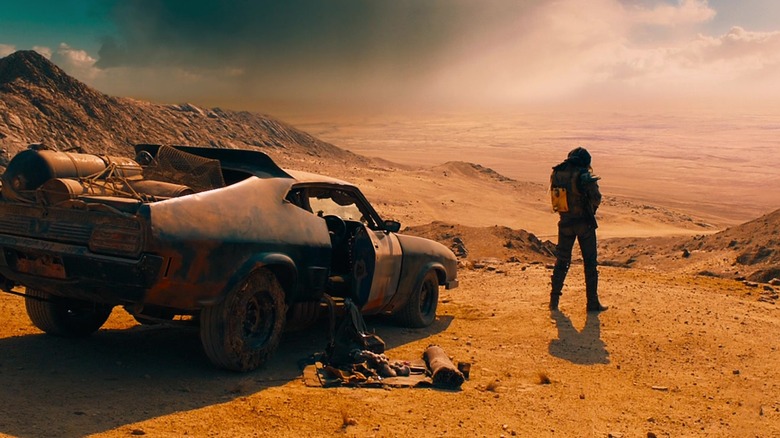Dead Movie Franchises That Got A Second Chance
All it takes is one bad sequel to kill a franchise. For instance, "Fantastic Beasts" was supposed to be a series of five films, but thanks to the disappointing box office of "Fantastic Beasts: The Secrets of Dumbledore," there seem to be no immediate plans to move forward with the last two films. Sometimes a franchise will even shoot itself in the foot before it gets to make a single sequel. (We're looking at you, "Artemis Fowl.")
Every now and then, however, a franchise that everybody had forgotten about will get another chance in the sun. If played right, a long-awaited sequel can bring back fans of the original while also reeling in a whole new generation. The following prequels, reboots, and legacy sequels all achieved exactly that. Ranging from sports biopics that passed the torch to the next generation to horror franchises that came back from the grave, here are the most memorable dead franchises that got a second chance.
Jumanji
Just like the cursed board game that Judy (Kirsten Dunst) and Peter (Bradley Pierce) bury at the end of "Jumanji," the "Jumanji" franchise lay dormant for more than a decade. Sure, the series briefly stirred in its sleep with the release of "Zathura," a movie that technically belongs in the franchise because it was adapted from the same series of picture books by Chris Van Allsburg. Yet "Zathura" flopped at the box office, and the world of "Jumanji" sank quickly back into obscurity.
Then along came "Jumanji: Welcome to the Jungle," which updated the series to appeal to the next generation of gamers. This 2017 reboot had almost nothing in common with the original aside from the basic premise. Unlike most sequels, there were no returning characters, just a blink-and-you-miss-it reference to Alan (Robin Williams). Of course, Peter and Judy's Aunt Nora (Bebe Neuwirth) did get a cameo in the next film, "Jumanji: The Next Level."
"Jumanji: Welcome to the Jungle" remains the best-reviewed and highest-grossing film in the franchise. Part of the sequel's success may come from its willingness to embrace comedy. The thrills of the jungle are twice as fun when the characters bicker amongst themselves — one factor that may explain why the original 1995 film didn't have quite the same cultural impact as its sequels. How can you cast a comedic genius like Robin Williams and then have him play the role completely straight-faced?
Star Wars
The original "Star Wars" trilogy is so beloved that any filmmaker attempting a sequel would have their work cut out for them. Most "Star Wars" fans were convinced that nothing could even come close to the original films, and the release of the prequel trilogy only cemented that conclusion. Jar Jar Binks almost singlehandedly stripped "Star Wars" of its dignity.
Yet, 10 years after the prequel series concluded, the seventh film in the franchise gave "Star Wars" fans a new hope. (You see what we did there?) If any "Star Wars" sequel was worthy to succeed the original trilogy, it was J.J. Abrams' "Star Wars: The Force Awakens," which struck a balance between exploring new territory and delivering what nostalgic fans wanted. The CGI effects were much more believable than "Star Wars: Episode I – The Phantom Menace" and the filmmakers also used some practical effects, which were so convincing that fans thought they were CGI. What's more, the comic relief we got from characters such as BB-8 and Chewbacca was a massive improvement over Jar Jar. It certainly didn't hurt that fan favorites like Han Solo (Harrison Ford) made a comeback as well.
The huge success of "Star Wars: The Force Awakens" opened the door for a whole expanded world of "Star Wars" media. Not only did its success allow Lucasfilm to continue the new trilogy, but it also paved the way for prequel films like "Rogue One: A Star Wars Story" and countless TV series.
Alien
The 1979 film "Alien" is arguably one of the best sci-fi movies of all time. Seven years later, James Cameron achieved the impossible by delivering "Aliens," an amazing sequel that lived up to the first one. Ever since then, however, the franchise has been in decline. Just look at the bleak "Alien 3," which even the director hated, or the tonally dissonant "Alien: Resurrection." The franchise reached an all-time low with "Alien vs. Predator" and its equally embarrassing sequel, which seemed to be the final nails in the coffin for the "Alien" series.
But if there's one thing we've learned about xenomorphs, it's that they're tough to kill. For the first time since the original film 30 years prior, director Ridley Scott returned to the franchise with his 2012 film "Prometheus." This prequel spent little screen time on the iconic aliens, but it still captured the same atmosphere as the first film and put the "Alien" franchise back on the map. Soon "Prometheus" dethroned "Aliens" as the highest-grossing film in the franchise.
To follow up this success, Scott filmed "Alien: Covenant." Its revenue at the domestic box office didn't quite make back its budget, which threw a wrench in Scott's plans to make another movie about the android David (Michael Fassbender). Nevertheless, there are still other stories from the same universe in the works, such as Fede Alvarez's "Alien" movie, and it's impressive that a franchise that began in the 1970s is still kicking in the 2020s.
Jurassic Park
Steven Spielberg's "Jurassic Park" is a classic. The movie opened up a world of franchise possibilities, but it also meant that any sequels would need to fight the uphill battle of living up to the first one. Many fans were disappointed to find that Alan Grant (Sam Neill) was nowhere to be found in "The Lost World: Jurassic Park," which focused on Ian Malcolm (Jeff Goldblum) instead. Neill would later return in "Jurassic Park III," but the film's choice to break up Alan and Ellie Sattler (Laura Dern) upset many fans of the couple from the original movie. The box office returns of "Jurassic Park III" weren't too shabby, but the film still remains the lowest-grossing "Jurassic Park" movie. Unsurprisingly, many moviegoers assumed that, after "Jurassic Park III," the franchise had gone the way of the dinosaurs.
Some 14 years later, the franchise returned to the big screen with the legacy sequel "Jurassic World." The film traded the pastoral San Diego Zoo-esque design of the original film for a type of tourist attraction that contemporary viewers would be more familiar with: a sprawling theme park like Universal Orlando Resort. While "Jurassic World" didn't receive the same critical acclaim as the first one, it did manage to surpass a billion at the box office and spawn two sequels.
Ghostbusters
Back in the 1980s, the "Ghostbusters" franchise was wildly successful. The original film became the highest-grossing film of 1984, while "Ghostbusters II" briefly held the record for the biggest one-day opening. Yet for almost three decades afterward, it seemed like the series was dead and buried. Dan Aykroyd and Harold Ramis attempted multiple times to make a sequel called "Ghostbusters III: Hellbent," but the film became stuck in another kind of netherworld: development hell. For a time, it also seemed unlikely that Bill Murray would be willing to return to the series.
Luckily, the franchise got not one but two second chances. First there was the female-led reboot in 2016. Despite casting some of the funniest contemporary comedians, the new "Ghostbusters" film couldn't make back its budget at the domestic box office, in part thanks to a misogynistic backlash to the casting.
The franchise was resurrected again in 2021 with "Ghostbusters: Afterlife," which started fresh with a younger generation while also satisfying nostalgic fans by bringing back old cast members — including Bill Murray. Rather than showing ghost infestations in New York City again, this legacy sequel placed a new spin on the franchise by setting the story in a rural Oklahoma town. "Ghostbusters: Afterlife" technically earned less than the 2016 reboot in its opening weekend and total box office run, but it was more profitable (and exceeded expectations overall) because it had a smaller budget.
Scream
"Scream" is another franchise that underwent multiple revivals, with mixed success. After the 10-year gap that followed "Scream III," director Wes Craven came back to helm "Scream 4." The film brought in an underwhelming $38 million at the domestic box office, making it the least lucrative of the franchise. Perhaps this was because the film's subversion of the slasher genre was less groundbreaking than it was when the first film came out in 1996. Meanwhile, "Scream: The TV Series" attempted to stretch out a tightly-paced horror story into a long series, pleasing exactly no one. For a time, it seemed like the beloved franchise would become as worn-out as the horror movie tropes that Randy (Jamie Kennedy) skewered in the first film.
However, the 2022 reboot (simply titled "Scream") gave Ghostface another chance in the spotlight, and he totally killed it. The film continued the tradition of bringing back police deputy Dewey (David Arquette), former journalist Gale (Courtney Cox), and Sydney (Neve Campbell), the girl who survived the original Ghostface. This sequel also found clever ways to give cameos to minor characters from previous installments, such as Martha (Heather Matarazzo) and Billy (Skeet Ulrich). However, despite all these returning characters, 2022's "Scream" kept its focus on a new generation of teens led by Sam (Melissa Barrera).
The fifth "Scream" movie performed so well that Paramount immediately greenlit a sequel. 2023's "Scream VI" proceeded to rake in more money than any other film in the franchise.
Shrek
"Shrek" was a surprise hit that kicked off an entire franchise. In fact, the sequel, "Shrek 2," was not only the highest-grossing animated film of 2004, but the highest grossing film of that year, period. Since then, however, the franchise has largely petered out. "Shrek 2" was followed by two sequels with lukewarm critical reception, plus a 2011 spin-off called "Puss in Boots" that was the lowest-grossing film in the franchise. With all these diminishing returns, most moviegoers assumed that would be the end of the story.
Yet more than a decade later, another sequel starring Puss (Antonio Banderas) showed that maybe the franchise still had a few more lives left. Learning from the success of "Spider-Man: Into the Spider-Verse," DreamWorks Animation decided to implement a more cartoony animation style rather than trying to render the characters as realistically as possible. The colorful and creative designs of "Puss in Boots: The Last Wish" breathed new life to the franchise, earning the film a Rotten Tomatoes score higher than any other film from the "Shrek" universe. Yes, the domestic box office of "Puss in Boots: The Last Wish," was smaller than the four Shrek films. But the film's revenue was still not too shabby, earning it a spot among the top 10 films of 2022 at the worldwide box office.
Rocky
The 1976 film "Rocky," with its inspiring story of boxing contender Rocky Balboa (Sylvester Stallone), won the Oscar for Best Picture and kicked off a string of sequels. Unfortunately, the "Rocky" franchise grew increasingly implausible and over the top with each sequel, until it all but sputtered out after the embarrassing "Rocky V" in 1990. The series got a brief revival with the 2006 film "Rocky Balboa," which followed a retired Rocky going back into the ring. After that, however, it seemed like there would be nowhere else to go with the "Rocky" franchise. Unless, of course, it told the story of somebody other than Rocky.
"Creed" tells the story of Adonis Creed (Michael B. Jordan), son of the late Apollo Creed (Carl Weathers), who was Rocky's first major opponent in the ring; the film shows that Adonis is an underdog, same as Rocky. This legacy sequel gave the franchise a second chance and launched a whole series of films about Adonis. "Creed" is the highest-rated movie in the franchise to date, and in fact all three "Creed" movies are considered better than any "Rocky" film except the original, according to Rotten Tomatoes. The franchise is still going strong: "Creed III" dominated the box office its opening weekend, even beating a film from the Marvel Cinematic Universe ("Ant-Man and the Wasp: Quantumania").
Bad Boys
The "Bad Boys" franchise is no stranger to long sequel gaps; after all, "Bad Boys II" came out eight years after the original. However, the franchise outdid itself with "Bad Boys for Life," which took decades to get off the ground. When it did, however, it made a jaw-dropping comeback. At the time of its release, "Bad Boys for Life" boasted the second-biggest opening weekend of any January film. The first two films were loathed by critics, but the legacy sequel earned itself a "Certified Fresh" score on Rotten Tomatoes.
Rather than simply giving the sequel the generic title of "Bad Boys III," the filmmakers instead made a callback to something Mike Lowrey (Will Smith) said in "Bad Boys II," choosing the title "Bad Boys for Life." The third film focused on what drew fans to the franchise to begin with — the playful banter between the two leads.
The first two films in the franchise were directed by Michael Bay, but for the third film, Sony decided to pass the reins to two up-and-coming directors: Adil El Arbi and Bilall Fallah. These two relative newcomers, who had only done indie films before, were overjoyed to be given a chance to direct a blockbuster in the franchise they had loved since childhood. "That is something you cannot forget," the pair told Inverse. Sony's risk totally paid off: "Bad Boys for Life" surpassed the previous two films in every way.
Halloween
Few film timelines are as confusing as that of the "Halloween" franchise. The series is riddled with countless retcons and contradictions, including the death of the heroine Laurie Strode (Jamie Lee Curtis) and the subsequent reveal that she faked her death. As if that isn't bad enough, the series contains three different movies titled "Halloween" and two called "Halloween II." All but two installments in the franchise have a "Rotten" score on the Tomatometer; the two exceptions are the beloved original film and the 2018 reboot. This reboot (simply titled "Halloween") was not the first sequel that brought back Jamie Lee Curtis to play Laurie, but easily the best.
In this film's timeline, Michael Myers has been behind bars since the events of the original 1978 film, but his presence has scarred Laurie for the rest of her life, and she is now simply bracing herself for his inevitable return. This sequel slyly retcons the detail from "Halloween II" about Michael Myers being Laurie's brother, dismissing it as just a rumor and thus freeing up the movie to take the story in a new direction. In fact, 2018's "Halloween" ignores most of the other confusing timelines from the previous sequels, bringing the complicated franchise back to the basics. This approach must have worked, because the 2018 film and its two sequels are the highest-grossing "Halloween" films ever.
Mad Max
In 1979, George Miller made his directorial debut with the post-apocalyptic film "Mad Max." He soon followed it up with two sequels: "The Road Warrior" and "Mad Max Beyond Thunderdome." After the latter film, which came out in 1985, it was reasonable to assume that the series was only meant to be a trilogy. Yet 30 years after the "Mad Max" franchise seemingly concluded, George Miller gave us the legacy sequel we never knew we needed.
Miller wanted to do a fourth "Mad Max" movie as early as 2001, but multiple versions stalled in development hell before he finally got a second chance to continue the dormant franchise. "Mad Max: Fury Road" is a soft reboot, ambiguous about how it connects to the timeline of the first three movies and whether or not Tom Hardy's Mad Max is even the same character as Mel Gibson's Mad Max. "Mad Max: Fury Road" is a whole different animal from any of the previous films, but it combines the most memorable elements of each: the taciturn hero we first met in "Mad Max," the vehicular mayhem from "The Road Warrior," and the campy costumes from "Mad Max Beyond Thunderdome."
Without a doubt, "Mad Max: Fury Road" is the most spectacular of the bunch, maintaining a Rotten Tomatoes score over 95% and bringing in more than $374 million at the worldwide box office. The film set the standard for legacy sequels for years to come.
